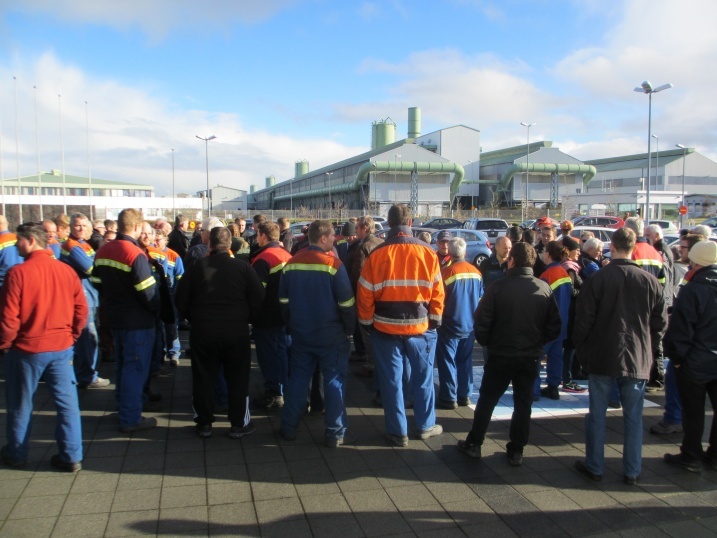16 March, 2016Rio Tinto has escalated a labour dispute at its aluminium smelter in Iceland by proposing that contractors be denied the right to strike. The company is also proposing to expand the use of lower paid contractors at the site.
Rio Tinto’s drive to increase the use of precarious labour and inflexibility in prolonged negotiations provoked workers that load the aluminium onto ships for export to begin an indefinite strike on 24 February. The company has replaced the strikers with local management and management from France.
Rio Tinto has sunk to a new low by demanding both increased lower paid contractors and a denial of their right to strike,” stated IndustriALL assistant general secretary Kemal Özkan. “Backing that demand by importing strike breakers from overseas shows just how far this company will go in its reckless pursuit of a more precarious workforce.”
Rio Tinto imported two more strike breakers from France this week. Both have a long history as Rio Tinto human resource managers and a reputation as being inflexible in labour negotiations. Neither are known to have experience as dockworkers and one of them turns 60 this year, raising serious questions about their ability to do the job safely and about Rio Tinto’s claim that safety is its top priority.
IndustriALL is coordinating a response by the Rio Tinto Global Union Network to the company’s anti-labour practices against workers in Iceland. Unions in a dozen countries where Rio Tinto has operations have sent letters of solidarity and offers of further support.
IndustriALL has worked with its sister global union, the International Transport Workers’ Federation (ITF), to track shipments from Rio Tinto’s Iceland smelter to different countries. Unions at customers of the smelter in Belgium, the Netherlands, Norway and the UK have expressed their support urging the customers to demand Rio Tinto negotiate a fair resolution of the strike. IndustriALL has also communicated with major Rio Tinto shareholders about the company’s attack on workers’ rights in Iceland.
Allowing Rio Tinto to import strike breakers and deny a category of workers the right to strike could expose the Government of Iceland to criticism at the ILO International Labour Conference which opens in May. It could also subject Iceland to a complaint with the ILO Committee on Freedom of Association.
Rio Tinto has recently faced two strikes in France. Workers at Carbone Savoie, which Rio Tinto is in the process of selling and where serious questions have been raised about health and safety, have struck in response to Rio Tinto’s failure to consult with unions on the sale and refusal to guarantee investment that would make the operation sustainable. Workers at the Dunkerque aluminium smelter have struck for a fair share of company profits.
“Rio Tinto has recently caused strikes in various countries through its approach to labour relations,” stated Kemal Özkan. “Rather than attempting to deny workers their fundamental rights, it’s time for Rio Tinto to work with unions in Europe and globally to develop a mature and constructive approach to industrial relations.”
